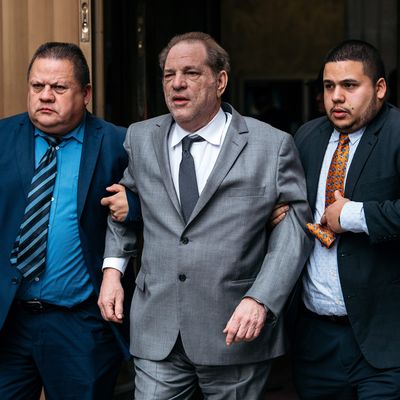
Harvey Weinstein’s rape and sexual-assault trial is scheduled to start next week in Manhattan. The disgraced movie mogul faces charges for alleged nonconsensual encounters relating to three women. On Monday, January 6, Weinstein, his lawyers, and prosecutors will appear at the 100 Centre Street courthouse to hash out any last-minute issues, and on Tuesday, jury selection starts. Jury selection will probably take two weeks, and then the rest of trial proceedings are expected to last another six weeks.
Weinstein’s trial marks a major moment for Me Too — the fact that a wealthy, powerful white man would actually be prosecuted for alleged sex crimes seemed to suggest that accusers might finally be heard. If the many twists and turns in Weinstein’s case say anything, however, it’s that the months-long trial won’t be as neat and tidy as what you see on Law & Order: Special Victims Unit. Here’s a rundown of the major developments from Weinstein’s May 2018 arrest to his trial.
Several women who have accused Harvey Weinstein of sexual misconduct are expected to appear at a 10 a.m. press conference at a park near the 100 Centre Street courthouse Monday morning in advance of his rape and sexual-assault trial; among the women are Rose McGowan and Rosanna Arquette, organizers said. The women are part of the “Silence Breakers,” a group of some two-dozen Weinstein accusers. They “will join together to demand that Weinstein is held accountable for the egregious crimes he has committed,” according to a press release. Weinstein’s trial starts Tuesday morning with jury selection. He has maintained his innocence.
How did Weinstein’s case start?
Weinstein was arrested in Manhattan on May 25, 2018, less than one year after the New York Times and The New Yorker published investigations detailing allegations of sexual abuse and assault against him that spanned decades. The NYPD’s arrest of Weinstein came amid other state and federal investigations. When Weinstein surrendered at the 1st Precinct station house in Tribeca, he conspicuously carried several books with him, including Todd S. Purdum’s Something Wonderful: Rodgers and Hammerstein’s Broadway Revolution and Richard Schickel’s Elia Kazan: A Biography.
Not surprisingly, the Kazan tome raised eyebrows. Not only was Kazan snubbed by Hollywood after naming entertainment-industry figures as communists in his House Un-American Activities Committee testimony — the director of On the Waterfront and A Streetcar Named Desire was a reputed womanizer who had been accused of sexual assault, per the Guardian.
So what is Weinstein accused of, exactly?
Right now, Weinstein faces five counts for alleged nonconsensual encounters involving former production assistant Mimi Haleyi and a still-undisclosed accuser. The counts are one count of rape in the first degree, one count of rape in the third degree, one count of a criminal sexual act in the first degree, and two counts of predatory sexual assault. Haleyi has accused Weinstein of forcibly performing oral sex on her at his apartment in 2006. The unidentified woman has accused Weinstein of raping her at a hotel in March 2013.
Prosecutors are poised to use testimony from Sopranos actress Annabella Sciorra, who accused Weinstein of raping her around late 1993, as her claim is contained in the counts of predatory sexual assault. It’s considered an “aggravating” or “underlying” crime, which is basically a crime that can be used to establish a pattern of behavior.
Weinstein had faced a count for an alleged 2004 attack on actress Lucia Evans, but it was dismissed in October 2018 after discrepancies surfaced in her account.
Will other women testify against Weinstein?
According to a court document, three other women are permitted to take the stand against Weinstein — and testify about uncharged alleged crimes. There is not much public information about these women. The court document suggests, however, that one woman will testify about an alleged incident in spring 2004 at a midtown hotel, one woman will testify about an alleged incident around May 2005 in Soho, and one will testify about an alleged incident in February 2013 at a Beverly Hills hotel.
This is similar to what happened in Bill Cosby’s trial. Five other accusers were allowed to testify that the disgraced comedian drugged and molested them, strengthening Andrea Constand’s accusations.
The judge’s decision allowing this testimony was a major victory for prosecutors. While prosecutors can’t use these other women’s testimony to allege it’s indicative of Weinstein’s bad character, or use their allegations of prior bad acts to prove that he had a propensity for such behavior, they can be used to show things such as intent and opportunity. (This is different from Sciorra, whose testimony could be used by prosecutors to establish an alleged pattern.)
“So, if they testify, ‘He offered me a job and invited me to his studio, and then he grabbed me,’ if that’s very similar to what the accuser is saying, then the jury is allowed to consider that,” Rebecca Roiphe, professor of law at New York Law School and former assistant district attorney in Manhattan, previously explained to Vulture. Jurors will be told “you’re not supposed to consider this evidence of Harvey Weinstein’s bad character and assume that because he has a bad character that he committed the charged crimes,” Roiphe said, but “it’s extremely hard for juries to do that in real life.”
What has Weinstein said about everything?
Weinstein has pleaded not guilty, and he has denied engaging in any nonconsensual encounters claimed in criminal or civil court actions. At various points, both Weinstein and his lawyers’ denials have characterized him as a victim who’s contending with unfairness.
In a New York Post interview several weeks ago, Weinstein said, “I feel like the forgotten man.” Weinstein, who was recovering from back surgery at New York–Presbyterian/Weill Cornell Medical Center, told reporter Rebecca Rosenberg, “I made more movies directed by women and about women than any filmmaker, and I’m talking about 30 years ago. I’m not talking about now when it’s vogue. I did it first! I pioneered it! It all got eviscerated because of what happened. My work has been forgotten.’’
Weinstein lawyer Donna Rotunno said in July that he had been “railroaded” by the Me Too movement. One of Weinstein’s past lawyers described him as a “man vilified by a vicious media assault” in November 2018. Arthur Aidala, another attorney currently repping Weinstein, claimed Weinstein couldn’t get a fair trial in New York City because of media coverage and possible jurors’ liberal beliefs.
“An internet search of the New York Post’s ‘Page Six,’ a mainstay of local New York City news, and the name Harvey Weinstein in 2019, yields over 11,000 hits,” Aidala wrote in court papers. “Political, cultural and social organizations with headquarters in Manhattan (‘MeToo’ and ‘Times Up’) were catapulted to prominence as a direct result of Harvey Weinstein’s arrest in this case and New York City is ground zero in their activism, with such activities as the so-called Women’s March, and the rallying cry ‘believe all women,’ a position that is antithetical to due process,” Aidala also claimed. “Polls show that this activism disproportionately impacts the opinions of Democrats, the largest demographic group in New York City on central issues in this case.”
What has Weinstein been like in court?
At Weinstein’s last appearance on December 11, he entered the courtroom hunched over a walker. Lawyers revealed in court that Weinstein was undergoing back surgery the next day, due to a car accident in August. “We insisted that he use a walker today,” Rotunno said after the proceeding. “We wanted him to use a walker … Mr. Weinstein didn’t want the press to think he was seeking sympathy,” she continued. “He’s in pain, he’s having surgery.” At an appearance about one week before that, he was seen briefly carrying a cane. Weinstein has often limped during his court appearances.
He has also had some awkward exchanges with Justice James Burke, the judge presiding over his case. When Burke warned Weinstein that his trial wouldn’t be postponed over health issues, he replied, “This is the only time I’ve asked [this] … This is a good thing.” In August, Burke told Weinstein to stop using his cell phone in court. He was also photographed leaving court with tic-tac-toe on a legal notepad.
What is the recent settlement with Weinstein accusers about?
In December, the New York Times was the first to report that Weinstein, more than 30 sexual-misconduct accusers, and his bankrupt film studio, the Weinstein Company, had agreed to a potential $25 million settlement that would bring an end to many assault and harassment lawsuits against him. Of the $25 million, $6.2 million would be for 18 accusers who filed lawsuits in the United States, the United Kingdom, and Canada. The remainder would go toward class-action participants and those who have not yet come forward with allegations. The tentative settlement is part of a $47 million agreement that intends to cover the Weinstein Company’s debts.
Under this proposed settlement agreement, Weinstein would not have to admit to any wrongdoing. He also wouldn’t have to cover any of the settlement money — it would be paid by his insurers.
Some participants expressed disappointment at the settlement sum, telling the Times, and later Vulture, that they thought it was the best chance of recovering anything given the Weinstein Company’s bankruptcy. Several accusers who have sued Weinstein are refusing to participate, believing that there has to be a better alternative.
Does the trial impact this settlement?
The controversial $25 million tentative settlement that would end many sexual-misconduct lawsuits against Weinstein relates to civil litigation against him — not his criminal case.
How much prison time could Weinstein get?
If Weinstein were found guilty on only the least serious charge, rape in the third degree, there is no minimum sentence. But the most serious charge, predatory sexual assault, carries a sentence of up to life in prison.
What do Weinstein’s accusers think about his upcoming trial?
A group of 25 women who came forward with sexual-misconduct allegations released a statement on Friday, January 3; they emphasized the trial’s importance for accusers “everywhere.”
“Next week, the world will be watching as Harvey Weinstein walks into court to stand trial for a fraction of the egregious crimes he has committed. Weinstein is a serial predator who sexually abused women for decades, taking advantage of his power and connections to systematically silence the women who could bring his crimes to light,” the statement said. “More than two years ago — thanks to the courage of so many women who risked everything to come forward — this ugly façade came down and he finally faced a public and professional reckoning for his actions. This trial is critical to show that predators everywhere will be held accountable and that speaking up can bring about real change. We refuse to be silenced and will continue to speak out until this unrepentant abuser is brought to justice.”
Does Weinstein have anything else to say about the trial?
Asked for comment on the trial, as well as other accusers’ claims of misconduct, a rep for Weinstein said in an email Friday, “Conflating the issues of the civil matters and criminal together on the eve of Jury selection only serve to try and taint a jury pool. It is prejudicial to continue jarring the public with information received through media with comments, interviews and talk from and of the ‘many’ who have asserted, alleged or implied some imprudence when the upcoming jury selection date is in fact for two complainants, both whom describe long term relationships with Weinstein, and are not similar to the grievances heard by civil litigants, or those who just lodged public grievances without being part of any suit.”
“New Yorkers are sophisticated enough to not be overly impressed with the agendas of those among Hollywood elites who may think their opinions on irrelevant matters will hold sway,” Weinstein’s rep said.
Update, February 24: Harvey Weinstein’s verdict has been announced.


